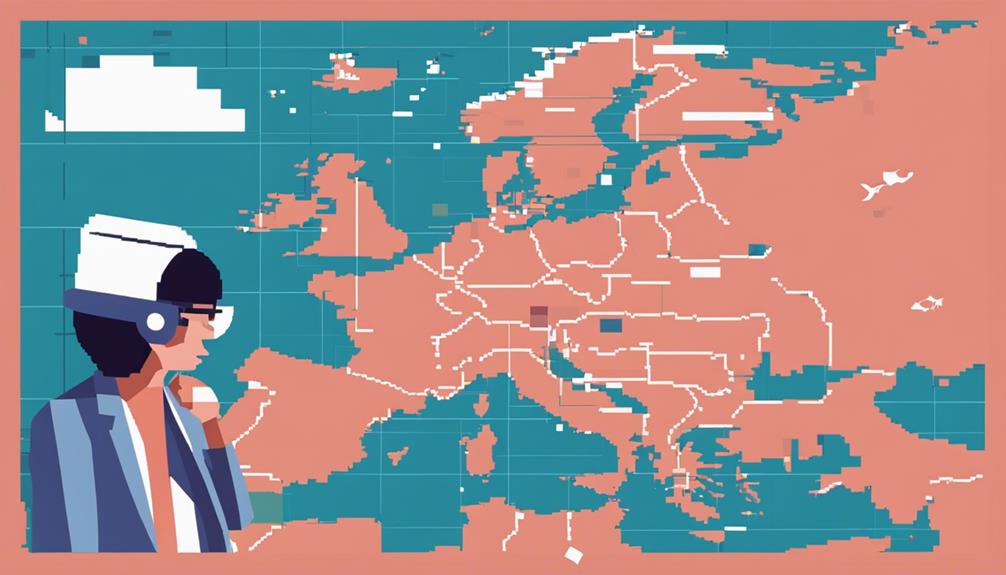The repercussions of Brexit on UK space policy have ushered in a new era of strategic recalibration within the country's space industry. With challenges looming on the horizon, including shifts in funding dynamics and regulatory frameworks, the UK faces a pivotal juncture in defining its global space positioning. As the implications of Brexit reverberate through the space sector, the necessity for innovative solutions and collaborative ventures becomes increasingly apparent. The intricacies of how the UK navigates these complexities and forges new paths in space exploration and technology will be critical in shaping its future trajectory in the cosmic arena.
Key Takeaways
- Uncertainty over UK's future involvement in EU space programs post-Brexit.
- Increased UK space agency budget to reduce reliance on EU funding.
- Challenges in accessing Galileo and Copernicus systems post-Brexit.
- Need for alternative partnerships and strategies to sustain UK's space capabilities.
Overview of UK Space Policy Pre-Brexit

The United Kingdom's space policy prior to Brexit was characterized by extensive participation in the EU's Galileo project, with a substantial investment of £1.4 billion, positioning the UK as a key contributor to European space endeavors. The Galileo project, a flagship initiative of the European Union aimed at developing a global navigation satellite system, relied on the UK's expertise in satellite navigation technology. Additionally, the UK collaborated with EU partners on Earth observation programs, enhancing capabilities in monitoring and understanding the planet's environment and resources.
Through its involvement in EU space initiatives, the UK leveraged shared resources and expertise to advance research, development, and innovation in the space sector. This collaboration not only contributed to technological advancements but also fostered economic growth by creating opportunities for UK companies to participate in European space projects.
Furthermore, the UK's emphasis on enhancing national security through space activities was evident in its pre-Brexit space policy. By engaging in satellite navigation programs like Galileo, the UK aimed to bolster its defense capabilities and strengthen its resilience in an increasingly interconnected and technology-driven world.
Significance of EU Collaborations
The EU collaborations were integral to UK's space policy, facilitating access to critical European positioning satellites and participating in key programs like Galileo and Copernicus, which provided essential data and infrastructure. Post-Brexit, the cessation of direct EU access posed challenges, necessitating the development of alternative strategies and negotiations for continued participation in EU space initiatives to sustain UK's space capabilities.
EU Space Projects
Amid Brexit's impact on UK space policy, the integral role of EU space projects in fostering collaboration and driving technological advancements stands as a critical consideration for future strategic planning.
- UK's participation in EU space projects like Galileo accounted for significant funding and collaboration opportunities.
- Brexit led to uncertainties over UK's future involvement in EU space initiatives and access to critical infrastructure.
- EU collaborations were instrumental in advancing UK's space capabilities and fostering research and development in the sector.
- UK's withdrawal from EU space projects post-Brexit necessitated the exploration of alternative partnerships and strategies.
- EU space projects played a key role in enhancing UK's technological advancements and competitiveness in the global space market.
Research Partnerships
Given the pivotal role of EU collaborations in advancing UK space research, the significance of these partnerships in fostering scientific advancements and innovation cannot be understated. EU collaborations have provided the UK with access to funding and expertise crucial for space exploration. Joint projects with EU counterparts have enhanced scientific advancements, allowing UK universities and research institutions to participate in cutting-edge space missions and discoveries. However, Brexit has raised concerns about the future of these research partnerships. The potential impact on the UK's access to EU research programs and facilities could hinder its ability to engage in cross-border research initiatives, affecting knowledge exchange and innovation in the space sector. Maintaining strong research partnerships post-Brexit will be essential for the UK to continue thriving in space exploration.
Changes to Funding Post-Brexit

Following the UK government's increase in the space agency's budget by ten percent to £556 million post-Brexit, significant changes to funding have emerged in the UK space industry. These changes are crucial for shaping the future landscape of the UK space sector. Here are some key points to consider:
- Increased Budget Allocation: The UK's decision to boost the space agency's budget post-Brexit demonstrates a commitment to supporting the growth and development of the domestic space industry.
- Reduced Reliance on EU Funding: With EU-funded programs accounting for only 2.5% of total UK space sector income, the shift towards increased domestic investment highlights a move towards self-sufficiency.
- Investment in New Systems: The commitment of £92 million to develop a new global navigation satellite system post-Galileo withdrawal underscores the UK's determination to enhance its capabilities independently.
- Support for Company Growth: The increased financial support post-Brexit is vital for driving the growth of high-potential companies within the UK space industry.
- Emphasis on Domestic Investment: Brexit has reshaped funding dynamics, emphasizing the need for greater domestic investment in the UK space policy to ensure resilience and competitiveness in the global space arena.
These funding adjustments post-Brexit reflect a strategic realignment aimed at fortifying the UK's position in the evolving space sector landscape.
Impact on Regulatory Framework
The impact of Brexit on the UK's regulatory framework for the space sector has raised concerns regarding the need for regulatory changes, adaptation challenges, and potential collaborations with the EU. As the UK navigates its separation from EU regulations, uncertainties persist regarding the alignment of licensing procedures, safety standards, and compliance requirements. Establishing a robust and clear regulatory regime post-Brexit is crucial to ensure the smooth operation and growth of the UK space industry.
Regulatory Changes Post-Brexit
Post-Brexit, the UK space policy has undergone significant regulatory adjustments to realign with new trade agreements and partnerships, ensuring compliance with international space standards and facilitating seamless operations within the industry.
- Adaptations made to align with new trade agreements
- Revision of regulatory framework for access to EU space programs
- Updates to address challenges in maintaining industry standards
- Modifications to ensure compliance with international space regulations
- Changes aimed at facilitating smooth operations, collaborations, and investments
These regulatory changes post-Brexit reflect the UK's commitment to adapting to the evolving landscape of international partnerships in the space sector while striving to maintain high standards and foster cooperation within the industry.
Adaptation Challenges for UK
Challenges in aligning the UK's regulatory framework with new international partnerships and agreements post-Brexit are presenting significant hurdles for the country's space policy adaptation and industry operations. The need to navigate changes in regulatory requirements post-Brexit is crucial for ensuring compliance and competitiveness within the evolving global space sector. Uncertainties surrounding regulatory alignment with EU standards post-Brexit add complexity to the development and implementation of UK's space policy. Strategic adjustments are imperative to address the regulatory complexities faced by the UK's space industry, fostering growth and enabling successful international collaboration. Aligning the UK's space regulatory framework with global standards post-Brexit is essential to maintain a competitive edge and drive innovation in the industry, despite the challenges posed by the new regulatory landscape.
Collaboration With EU
Navigating the evolving regulatory landscape following Brexit requires strategic recalibration of the UK's space policy collaboration with the EU.
- Brexit has necessitated a reevaluation of regulatory alignment in space policy coordination.
- Disruptions in UK's participation in EU programs have impacted regulatory frameworks.
- New regulatory agreements are essential post-Brexit for space cooperation.
- The UK must redefine regulatory relationships to address the impact of Brexit on collaboration with the EU.
- Changes in regulatory frameworks demand a reassessment of the UK's approach to space policy coordination within the EU.
Future of Access to EU Space Programs
Amid the uncertainty surrounding the UK's withdrawal from the EU, the future of access to vital EU space programs, such as Galileo and Copernicus, remains a pressing concern for stakeholders in the space industry. The UK's participation in these programs post-Brexit is uncertain, leading to the exploration of alternatives to ensure continued involvement in European space initiatives. Brexit has introduced challenges for the UK's role in EU space projects and collaborations, necessitating ongoing negotiations to secure access to EU space programs despite the implications of the UK's withdrawal.
—
| EU Space Programs | Impact on UK |
|---|---|
| Galileo | Uncertain |
| Copernicus | Uncertain |
| Alternatives | Being Explored |
| Negotiations | Ongoing |
—
The table above summarizes the current situation regarding the UK's access to EU space programs. The uncertainty surrounding programs like Galileo and Copernicus highlights the need for swift action to mitigate potential disruptions in the UK's participation in crucial European space initiatives. The exploration of alternative solutions and the ongoing negotiations signify the efforts being made to secure continued access to these programs post-Brexit. Stakeholders are closely monitoring these developments as they navigate the complexities of the UK's future involvement in EU space endeavors.
Implications for Satellite Manufacturing

The implications of Brexit on UK satellite manufacturing encompass challenges within supply chains, changes in regulatory compliance requirements, and potential restrictions in market access. These factors are critical considerations for satellite manufacturers in the UK as they navigate uncertainties post-Brexit. Strategic decisions surrounding supply chain management, regulatory alignment, and market diversification will be pivotal in shaping the future competitiveness of the UK satellite manufacturing sector.
Supply Chain Challenges
Brexit-induced supply chain challenges pose significant implications for the satellite manufacturing sector in the UK. The following factors highlight the potential impacts on the industry:
- UK satellite manufacturers heavily rely on components imported from the EU for satellite production.
- Post-Brexit customs checks and delays at borders could disrupt the timely delivery of satellite parts.
- Increased costs stemming from new tariffs and regulations on EU imports may affect the competitiveness of UK satellite manufacturers.
- Ensuring smooth supply chain operations is crucial for maintaining the UK's position in satellite manufacturing post-Brexit.
Regulatory Compliance Changes
Given the evolving regulatory landscape post-Brexit, satellite manufacturers in the UK are experiencing significant adjustments in compliance requirements, impacting their manufacturing processes. The UK satellite manufacturers now need to adhere to different rules and standards, leading to operational shifts and reevaluations of supply chains. This transition has introduced challenges in adapting to the new regulatory environment, prompting companies to reassess their manufacturing strategies. The table below provides a snapshot of the key regulatory compliance changes affecting satellite manufacturing in the UK post-Brexit:
| Regulatory Compliance Changes | Implications for Satellite Manufacturing | Challenges Faced | Mitigation Strategies |
|---|---|---|---|
| New rules and standards | Operational adjustments | Adapting to changes | Review and update procedures |
| Compliance requirements | Supply chain reevaluation | Regulatory uncertainty | Collaborate with regulatory bodies |
| Shifts in manufacturing processes | Increased scrutiny on processes | Compliance costs | Invest in technology solutions |
Market Access Restrictions
Amidst the post-Brexit landscape, market access restrictions are significantly impacting the operations of UK satellite manufacturing companies.
- Brexit has limited UK market access to the EU's Galileo satellite navigation system.
- Challenges exist for UK companies in participating in Galileo's Public Regulated Service, affecting satellite manufacturing contracts.
- The UK's exit from Galileo has spurred efforts to develop an independent global navigation satellite system, influencing future manufacturing projects.
- Uncertainties post-Brexit, such as trade arrangements and access to critical satellite programs, are being navigated by UK satellite manufacturers.
- Market access restrictions post-Brexit are prompting UK satellite manufacturers to seek alternative partnerships and growth strategies.
Security Concerns and Brexit

The UK's post-Brexit security concerns in the space industry are exacerbated by its loss of access to Europe's critical positioning satellites. With Brexit leading to the exclusion from Europe's Galileo satellite navigation system, the UK faces heightened vulnerabilities in its space sector. This loss necessitates a shift towards increased reliance on the US-owned GPS navigation system, introducing potential security risks due to dependency on a single system. The UK's exposure to these security concerns is significant, as state-commissioned research indicates that the absence of satellite navigation systems could result in a daily cost of over £1 billion to the UK economy.
To address these challenges, British officials are proactively developing crisis management strategies to safeguard against potential disruptions in critical systems that rely on EU space infrastructure. Establishing a robust backup plan is essential to mitigate the risks associated with Brexit-related security challenges in the space industry. Ensuring the continuity of essential services and preventing potential downtime due to security vulnerabilities post-Brexit is crucial for the UK's overall security and economic stability. By acknowledging and actively preparing for these security concerns, the UK can navigate the complexities of its evolving space policy landscape in a post-Brexit era.
UK Space Industry Competitiveness
Enhancing the United Kingdom's space industry competitiveness requires a strategic and adaptive approach to navigate the evolving global market dynamics post-Brexit. The UK space sector has shown remarkable growth, tripling in size since 2000, and reflecting strong competitiveness. However, the decision to withdraw from the Galileo project, in which the UK invested £1.4 billion, has necessitated the development of alternative strategies to maintain its position in the global space market.
- Investment in Small Satellites: Embracing the trend towards small satellites can enhance the UK's competitiveness by fostering innovation and cost-efficiency.
- Development of National Space Strategy: Establishing a clear and comprehensive national space strategy is crucial to provide direction and coherence in the post-Brexit landscape.
- Exploration of Alternative to Galileo: Creating an independent navigation system as an alternative to Galileo is essential to ensure the UK's autonomy in space-related endeavors.
- Collaboration within the UK Space Sector: Encouraging collaboration and partnerships within the UK space industry can drive competitiveness through shared expertise and resources.
- Focus on Research and Development: Prioritizing research and development initiatives can bolster the UK's technological capabilities, making it a formidable player in the global space market.
Influence on Space Research Partnerships

Brexit's impact on UK space research partnerships necessitates a thorough reassessment of collaborative frameworks and funding mechanisms in the evolving landscape of space exploration. The UK's involvement in European space research programs, such as Galileo and Copernicus, is at risk due to uncertainties surrounding Brexit. As the UK exits the EU, existing partnerships with EU member states in space research face potential disruptions. This has prompted a reevaluation of the UK's participation in collaborative projects and access to funding sources from EU initiatives. The changing dynamics post-Brexit have introduced challenges in maintaining current partnerships and establishing new ones within the European space research community.
The influence of Brexit on UK space research partnerships extends beyond immediate concerns about funding and access to expertise. It also raises questions about the future alignment of UK space policy with European initiatives. The uncertainties surrounding Brexit have highlighted the need for the UK to adapt its approach to international collaborations in space research. The evolving landscape post-Brexit may require the UK to explore alternative partnership models and funding mechanisms to ensure its continued participation in European space research endeavors. As the UK navigates the complexities of disentangling from EU frameworks, strategic decisions regarding space research partnerships will play a crucial role in shaping the country's position in the global space exploration arena.
Impact on Space Innovation and Technology
Amidst the challenges posed by the UK's withdrawal from the European Union, the impact of Brexit on space innovation and technology in the UK's space sector is significant. The repercussions of Brexit on the UK's space industry are far-reaching, particularly in the realm of innovation and technology. Here are some key points to consider:
- Disrupted International Partnerships: Brexit has created uncertainties around existing international collaborations in space innovation, affecting the UK's ability to engage in joint projects with European partners.
- Industry Slowdown: The pace of innovation within the UK space sector has been hampered by the uncertainties brought about by Brexit, leading to delays in the development and adoption of new technologies.
- Challenges in Strategy Formation: The UK space industry is facing challenges in formulating new strategies for innovation post-Brexit, as the landscape of funding and collaboration has shifted.
- Need for Industry Resilience: To maintain its competitive edge, the UK space industry must adapt to the new international landscape, forging new partnerships and investing in innovative technologies.
- Importance of Strategic Investments: Post-Brexit, it is crucial for the UK space sector to prioritize strategic investments in innovation to ensure its continued growth and relevance in the global space industry.
Brexit's Effect on Space Workforce

The implications of Brexit on the UK space industry extend to concerns regarding the movement and availability of skilled workers within the sector. Access to international talent and expertise in the space workforce post-Brexit is uncertain. UK space companies are facing challenges in recruiting and retaining EU nationals due to Brexit implications, including potential restrictions on the free movement of workers. These workforce changes could impact the diversity and expertise of the UK space workforce.
The UK space sector has thrived on the contributions of a diverse workforce, benefiting from the knowledge and skills brought in by professionals from various countries. However, the uncertainties surrounding Brexit have cast a shadow over the future availability of such talents. The restrictions on the movement of skilled workers could hinder the industry's ability to innovate and grow, potentially affecting its global competitiveness.
As Brexit unfolds, the UK space industry must navigate these challenges by potentially reshaping its recruitment strategies, investing in upskilling programs for domestic talent, and fostering collaborations with non-EU countries to supplement any gaps left by the changing workforce dynamics. Adapting to the new post-Brexit reality will be crucial for sustaining the UK space sector's growth and competitiveness in the international arena.
Opportunities for UK Space Sector Growth
Exploring avenues for bolstering the UK space sector's growth amid evolving market dynamics and technological advancements remains a focal point for strategic development initiatives. Despite the challenges posed by Brexit, the UK space industry is actively seeking opportunities to enhance its position in the global arena. Here are some key areas where the UK space sector is focusing its efforts for growth:
- Small Satellites: With a strategic aim to capture 10% of the global space economy by 2030, the UK is concentrating on micro-launchers for small satellites, tapping into the growing demand for agile and cost-effective satellite solutions.
- Space Debris Management: Addressing the critical issue of space debris management presents a unique growth opportunity for the UK. Developing technologies and strategies to mitigate the increasing space debris problem can position the UK as a leader in sustainable space practices.
- Small Rocket Launches: The UK's emphasis on small rocket launches aligns with the trend towards dedicated launches for small satellites. By offering tailored launch services, the UK can cater to the specific needs of the small satellite market.
- Niche Roles: In response to Brexit challenges, the UK space sector is pivoting towards niche roles such as space debris management and small rocket launches. By specializing in these areas, the UK can carve out a distinctive competitive advantage in the global space industry.
- Global Navigation Satellite System: The commitment of £92 million towards developing a new global navigation satellite system post-Brexit presents a significant growth opportunity for the UK. By establishing a robust navigation infrastructure, the UK can enhance its position in the satellite navigation market.
Global Positioning Challenges Post-Brexit

Given the UK's critical dependency on the US-owned GPS navigation system post-Brexit, navigating the global positioning challenges has emerged as a pressing concern for the country's space policy. The potential loss of access to satellite navigation systems could result in staggering costs for the UK economy, estimated at over £1 billion a day. State-commissioned research has underscored the escalating risk posed by electronic warfare systems in Europe, further complicating the UK's position in securing reliable positioning data.
In response to these challenges, British officials are actively developing crisis plans to prevent essential systems, reliant on GPS technology, from going offline. The urgency for a robust backup plan is evident, as any disruption to these critical services could have severe consequences. Ensuring continuity in satellite navigation services is paramount to safeguarding various sectors, including transportation, telecommunications, and emergency response operations.
The UK's strategic positioning in the realm of space policy necessitates a proactive approach to address vulnerabilities in the global navigation landscape post-Brexit. By formulating comprehensive crisis management strategies and investing in resilient infrastructure, the UK aims to mitigate the risks associated with potential disruptions to the GPS navigation system. This strategic foresight will be instrumental in upholding the country's position as a leader in space technology and ensuring the security of essential services in an increasingly interconnected world.
Frequently Asked Questions
How Has Brexit Impacted the Uk?
Brexit has significantly impacted the UK by disrupting economic repercussions through uncertain trade agreements and changes in immigration policies. Diplomatic relations have also faced challenges due to the UK's withdrawal from the EU. The aftermath of Brexit has led to a period of political and economic instability, with the UK government striving to navigate these complexities and redefine its global position in various sectors.
How Much Damage Has Brexit Done to the Uk?
How much damage has Brexit done to the UK's economic fabric, trade agreements, political stability, and global relationships? The repercussions of Brexit have been significant across these fronts, leading to economic uncertainty, disruptions in trade agreements, political instability, and strained global relationships. As the UK navigates through the aftermath of Brexit, the extent of the damage becomes increasingly apparent, impacting various aspects of the country's functioning and international standing.
What Are the Disadvantages of Brexit for the Uk?
Brexit has brought significant disadvantages for the UK, including economic repercussions such as trade implications and regulatory challenges. The country faces increased barriers to trade with the EU, impacting various industries. Political consequences have also emerged, with Brexit causing division and uncertainty in the government. Regulatory challenges have arisen due to the need to establish new frameworks for various sectors previously governed by EU laws.
Is the UK Still in the European Space Agency?
The UK remains an active member of the European Space Agency (ESA), fostering space cooperation, research, and groundbreaking projects. Despite Brexit, the UK continues to invest in ESA initiatives, maintaining its role as a top contributor. Regulatory changes and collaborations may evolve, offering new opportunities for future partnerships. The UK's participation in ESA post-Brexit demonstrates a commitment to innovative space exploration and development.
